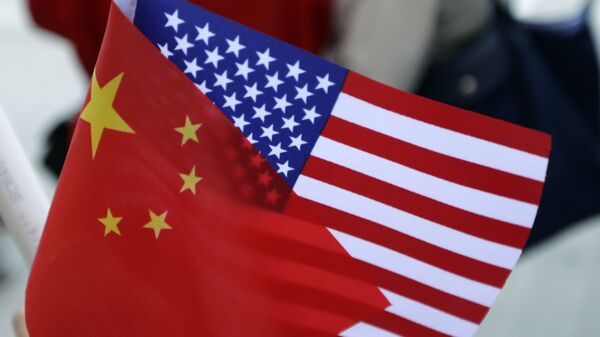The CNBC news outlet has quoted experts as saying that despite the US’s current leading positions in some areas of its technology rivalry with China, Washington should avoid resting on its laurels and focus instead on cooperating more with its allies as well as re-orientating domestic policy to boost competitiveness.
The warning comes as the two countries remain involved in an increasing competition to dominate various fields of next-generation technology, including 5G networks and artificial intelligence (AI).
"The US-China competition is essentially about who will control the global information technology infrastructure and standards", Frank Rose, senior fellow for security and strategy in the Foreign Policy programme at the Brookings Institution, was cited by CNBC as saying during a webinar earlier in May.
Michael Brown, director of the defence innovation unit at the US Department of Defence, for his part asserted that China has yet to get the better of the US in such areas as the production of jet engines and semiconductors.
"So they're [China] not quite there yet, but I think we can't rest on our laurels. I think they very much can compete, and that's what makes me very concerned, if we don’t wake up and see what we need to do to compete", he told the Brookings Institution webinar earlier this month.
The same tone was struck by Scott Moore, director of the Penn Global China Programme at the University of Pennsylvania, who warned during the same webinar that China remains the "only one whose scale could potentially […] pose a threat to American pre-eminence" in the biotech sector.
Andrew Imbrie, senior fellow with the Centre for Security and Emerging Technology at Georgetown University, in turn recalled that the US and its allies comprise almost two-thirds of global R&D, which is why "there's extraordinary ways we can try to leverage that pool of research and development and coordinate on shared priorities".
Apart from investing in research, the US government should hammer out a "more important and more difficult strategy" that would involve the "need to reform our business thinking, and our capital markets, to move away from short-term thinking, to be more long-term oriented", according to Brown.
He cautioned that the US business community's short-term thinking may hamper the country's efforts to win a "superpower marathon" with China. "We have to reform this or we're not going to be successful in competing with" Beijing, Brown pointed out.
The remarks come as the Chinese government prepares to release its 15-year blueprint, the so-called "China Standards 2035", to outline its plans on setting international standards for future technologies.
This was preceded by Beijing signaling an intention in 2017 to become a global leader in AI by 2030; 2015 saw the presentation of the Made in China 2025 plan aimed at helping the country dominate global high-tech production.
US-China Tensions
Tensions between the US and China are on the rise as Washington levels accusations against Beijing for alleged underreporting and mismanaging the COVID-19 epidemic, something that the Chinese government vehemently rejects.
Adding fuel to the fire is America's ongoing crackdown on the Chinese tech giant Huawei which was blacklisted by the Department of Commerce in May 2019. The department cited national security concerns that Huawei's 5G networks could be used by the Chinese government for spying, allegations that are denied by both Huawei and Beijing.


